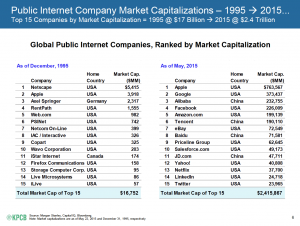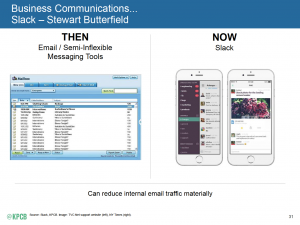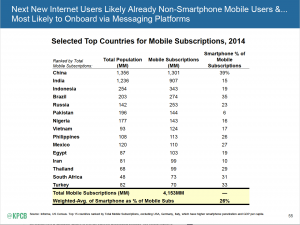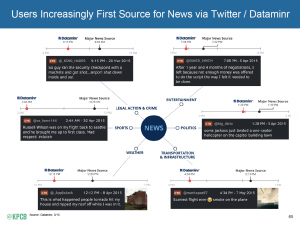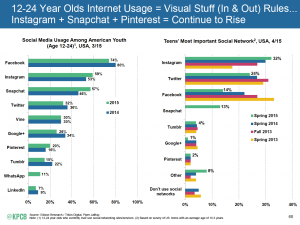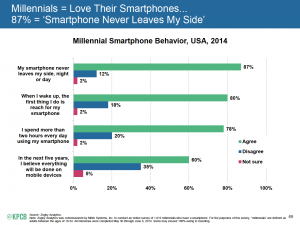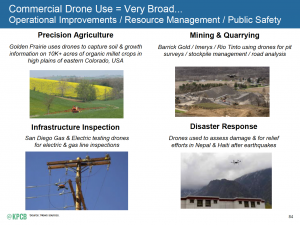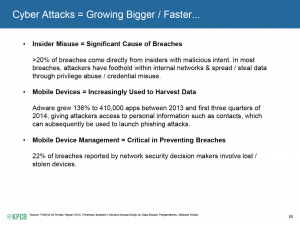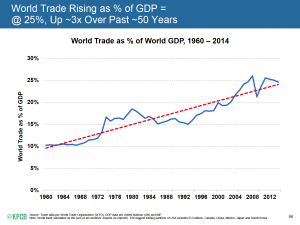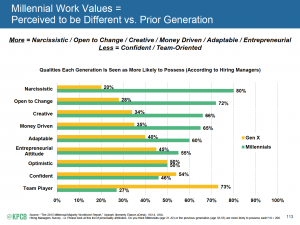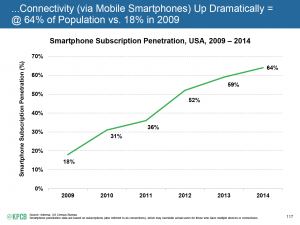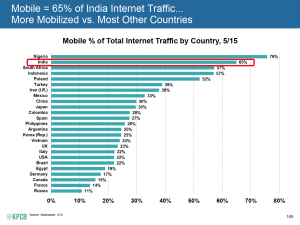The Internet Goes Mobile
One of policy wonkdom’s annual milestones is the publication of Mary Meeker’s slide deck on Internet trends (2015 Internet Trends.) Meeker’s slide deck is a massive overview of national and global economic trends, developments in Internet markets, and the ways that networks are changing work and social life.
Because Meeker’s deck is so big (194 slides), part of the ritual is extracting the top slides; here’s my favorite dozen.
1. The list of companies that dominate the Internet economy has changed dramatically since 1995. The top 15 now includes 10 US firms and five in China, and they’re all companies who use the Internet rather than those who build its essential elements as they were in the past when PSINet, Netcom, and similar companies dominated.
2. Meeker does a fascinating tour of the ways that Internet apps have changed the way we socialize and do business. One of the strongest impacts on business has been made by communication apps like Slack, which has replaced e-mail as the primary means of group collaboration. If your company doesn’t use Slack, you should ask yourself why.
3. New Internet users now come from the pool that’s accustomed to mobile phones. As they upgrade to smartphones, they begin to use the Internet for the first time. There’s a lot of room for smartphone growth in the developing world, but very little in the US. That doesn’t mean stagnation in the US as much as it means churn.
4. Users increasingly get their news from Twitter and Dataminr. Sad news for the troll blogs who hope to profit from virality and further evidence of the decline of traditional news outlets such as TV and newspapers who are just too slow.
5. Instragram is growing in popularity among teens, who say it’s their most important social network. Facebook is still more heavily used, but its trend line isn’t favorable. It’s unclear whether teens on Instagram become adults on Facebook.
6. Millennials love their smartphones so much they sleep with them.
7. Meeker is very excited about commercial drones. This augurs well for the Internet of Things and for the 5G networks that will begin to appear in the 2020s to power it. It’s also a good use case for millimeter wave radios.
8. An enormous number of cyber attacks come from inside the company or through lost mobile devices. This is only marginally fixable by technology through kill switches and re-authentication.
9. This isn’t Internet per se, but trade is on the rise globally as it continues to account for a larger portion of total world GDP. This trend is certainly facilitated by the Internet even though it’s not caused by it.
10. Hiring managers perceive millennials as more narcissistic than Gen Xers, but also more open to change, creative, money-driven, adaptable, and entrepreneurial. Gen Xers are seen as confident team players. Which is the more desirable set of traits? Gen Xers come from an education system that over-emphasized group work, while the narcissistic millennials are more than willing to go it alone.
11. Smartphone adoption has risen dramatically in the US, and we’re not done yet.
12. India is the fastest-growing market for Internet use, and the growth is happening on smartphones. 65% of India’s Internet traffic comes from the mobile network compared to 22% in the US. Very different worlds.
What you make of these trends depends on what your interests are, but the overall takeaway for me is that mobile is dramatically transforming the way we live and work and we ain’t seen nothing yet.
It’s also worth noting that public policy in the Internet space remains out-of-step with business and technology. While the FCC coddles services companies and promotes faster wired connections, the predominate usage model for the Internet has shifted to mobile and the services sector is doing fine.




